02023-07-12 | Language, Portugal
Some Portuguese people regard desenrascanço as a key Portuguese virtue and a living part of their culture.
desenrascanço – Wiktionary
Disentanglement, the removal of complications or confusion, a hack, a MacGyverism, the ability to find improvised solutions to problems.
02023-07-01 | Lx, Photos, Portugal
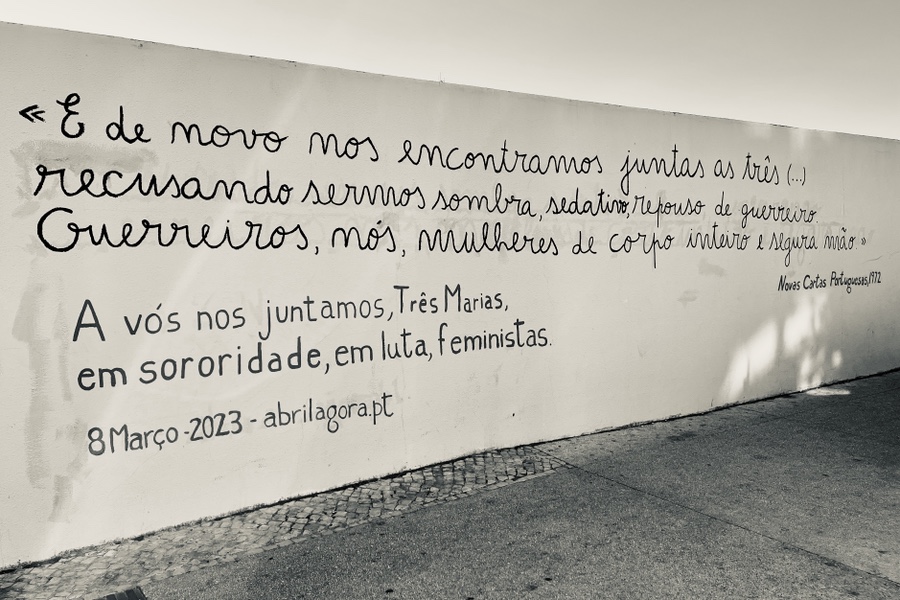
Walked by that wall in the morning. I enjoy literary graffiti! A little later, I sat down in a cafe and, aided by a pão de queijo and a cappuccino, attempted a translation. I think this covers the meaning, but my Portuguese is lousy:
And again we find ourselves together, the three,
refusing to be the sedative shadow of a warrior’s rest.
Warriors, we, women of full (whole?) body and holding hands.
New Portuguese Letters 1972
We join you, Tres Marias,
in sorority, in struggle, feminists.
8 March 2023
Wikipedia has this (LINK)
New Portuguese Letters (NPL) was conceived in 1971, three years before the Carnation Revolution and the consequent independence of the Portuguese colonies in Africa. Its authors, Maria Isabel Barreno, Maria Teresa Horta and Maria Velho da Costa, were already established writers. They began to meet twice weekly in Lisbon, publicly for lunch and privately for dinner, in order to “examine the problems they shared as women and as liberal writers.” A volume of poetry by Horta had recently been banned, and they intended their new work as a direct challenge to the censors, and also, one critic has written, as “an incitement to insurrection, based on the conviction that “when woman rebels against man, nothing remains unchanged“
Emphasis my own. Well, it should happen more often then!
02023-05-31 | Language, Portugal
More water based imagery. I wrote about the plop of the frog in the pond and now I will tell you my favorite name for a vegetable. It’s a name for the broad green bean that is often battered and fried in Portugal. And which inspired the Japanese art of Tempura cooking. One name for that broad bean is: Peixinho da horta
Peixe is fish and peixinhos are little fish. While a garden is jardim, a vegetable garden is called horta. So the phrase means Little Fish from the Vegetable Garden.
02023-04-23 | Photos, Portugal, Wine
There are about a dozen wine growing areas in Portugal. I learned that wine culture in this country developed in relative isolation and thus there are over 250 indigenous varieties of grapes, most of which we are not familiar with.
I have tried wine from a few of the regions. There is the Douro valley, east of Porto, which is probably the most famous, the Dão region, southeast of Porto, and Tejo, near Lisbon – Tejo is the Portuguese name of the river that is called Tagus in English. There is also the Alentejo.
I think some of the tinto (red wine) from Alentejo is really special. Some restaurants or shops might try to steer you towards wine from Douro or Dão, simply because those wines are delicious and easy to like. But if you insist they might bring you a wine from the Alentejo. I have heard the phrase, not for beginners, a couple of times.
There are lots of small grocery stores all over Lisbon. Every neighborhood has a few. They can exist alongside big supermarket chains, like Auchan and Continental, because they offer a special hand picked selection of items. Comida Independente, for example, is where I found Nosso Chá, the organic tea grown in Portugal, that was mentioned in this post. Because most of the inventory in the little mercearias is handpicked, the staff is also quite knowledgable about it. I went to a small such store in my neighborhood and asked for a bottle of red wine for around 20€. I believe a bottle of wine from Douro was recommended. It was good. I went back and asked for a bottle of red from the Alentejo. It’s not for beginners, they said. I smiled and said I understood. I had had a lovely glass of tinto from the Alentejo in a restaurant and knew what they meant. Ah, they said and pulled a bottle from the smaller Alentejo section. It was a bottle from this winery. It is my favorite wine and at a price I can afford, they said. That sounded good to me. I bought the wine, and some chocolate, and a week later I went back and bought a second bottle. I liked it a lot.
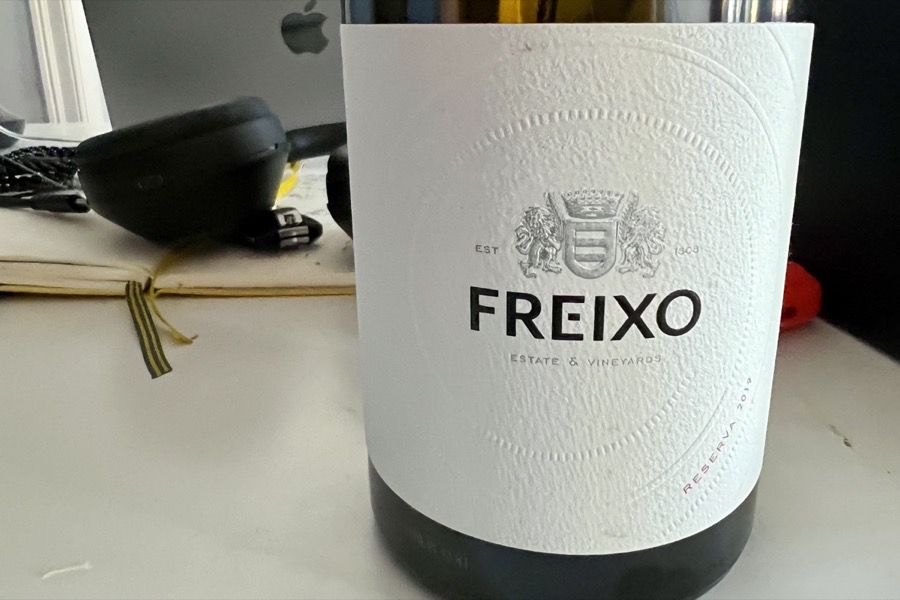
The wine reminded me of some bottles I have had from the Priorat region near Barcelona. (also see this post from 2008) The vines are dry-farmed there and because of the water level underground, the roots have to work extra hard. Instead of having to go down just a few feet they have to drill down 20 feet. That struggle makes the wine more intense. I am guessing that the vines in Alentejo are involved in a similar struggle.
That struggle is the reason for this post… people are just like wine! We try to avoid struggle, which is only natural, but it is the struggle that makes us sweet. I learned this time and time again. The people who move me the most are people who weathered a storm, and sometimes multiple storms. There is something in the struggle, the rising against a tide, the moving forward instead of resigning, that alters them and makes them glow with… something. Take a look at Roshi Joan Halifax’s photos from Tibet – you can find some of them here. Roshi takes amazing photos of people. This is a favorite image. Just looking at the person makes you smile, doesn’t it?
This does not mean that I wish strife and struggle on anyone but perhaps we can remember, when we do have to struggle, that the struggle might turn us into a fine wine.
02023-04-16 | Food, Portugal, Website
I knew that there are two main words for the popular beverage made from Camellia sinensis, namely TEA and CHA. I remembered that it depended on which port in China the tea left from. In the south of China the infusion drink was called teh, or tê, which is also how it is pronounced in German, where it is written Tee. (I think it is the only word in German that has a consonant followed by two identical vowels)
In the north of China the drink was called cha.
After reading my post about hacking matcha in my kitchen, Yumiko sent me a link to a Portuguese website that sells tea and tools. Read their story here. It’s remarkable!
Nosso Chá is the result of the first harvest of green tea in continental Portugal. Our tea plantation is situated in what is known as “the land of the camellias” on the coast of Northern Portugal and is the first of its kind in this location. Chá Camélia uses only organic, artisanal production methods. Nosso Chá is picked by hand and processed in an Asian style.
Nosso Chá – Comprar Own Production en línea – Chá Camélia
Very impressive. I also found the following quote, but can’t find any evidence to support the claim of TEA being an acronym.
Luso Chá celebrates the first European imports of tea by the Portuguese in the 19th century, in which the boxes were marked with the acronym “TEA”, an abbreviation for Transport of Aromatic Herbs. The origin of the word TEA that the English then gave to this incredible drink.
Luso Chá – Comprar Own Production en línea – Chá Camélia
I looked at the Wikipedia entry for tea and found that my memory was mostly correct.
The etymology of the various words for tea reflects the history of transmission of tea drinking culture and trade from China to countries around the world. Nearly all of the words for tea worldwide fall into three broad groups: te, cha and chai, present in English as tea, cha or char, and chai. The earliest of the three to enter English is cha, which came in the 1590s via the Portuguese, who traded in Macao and picked up the Cantonese pronunciation of the word. The more common tea form arrived in the 17th century via the Dutch, who acquired it either indirectly from the Malay teh, or directly from the tê pronunciation in Min Chinese. The third form chai (meaning “spiced tea”) originated from a northern Chinese pronunciation of cha, which travelled overland to Central Asia and Persia where it picked up a Persian ending yi.
Tea – Wikipedia
Cha from the Portuguese and Tea from the Dutch. Chai is Cha plus a Persian “yi”. All this learning about tea… I had to get up and make a glass of matcha.
I love that organic green tea is produced in northern Portugal and will find a store in Lisbon that carries it.
Portugal isn’t the only new ground for growing tea. Here is a video about a tea grower on Vancouver Island and here is their website.
Thanks Yumiko.
02022-11-28 | Buddhism, Lx, Photos, Portugal
May all be happy.
May all be healthy and safe.
May all have enough.
May all be at peace.
This time I didn’t write “beings” because I realized that I want to include mountains and rivers.
I walked by my cactus friend and saw that they were doing well and are even taller than when I saw them in the summer:
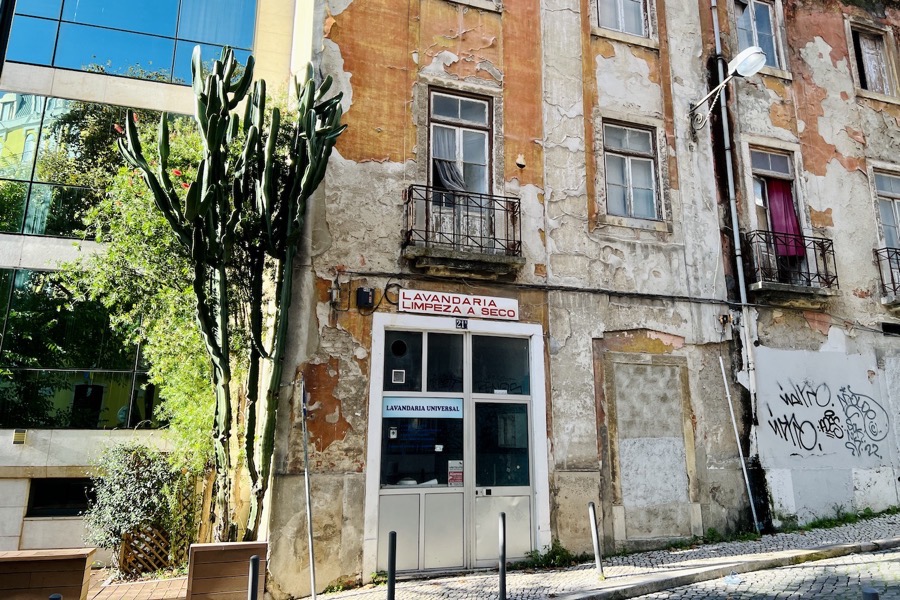
I was in a store to investigate and instigate heating/cooling units for my apartment, since it has neither. While there, I saw this little growing pod. This would have looked sooooo futuristic twenty years ago!
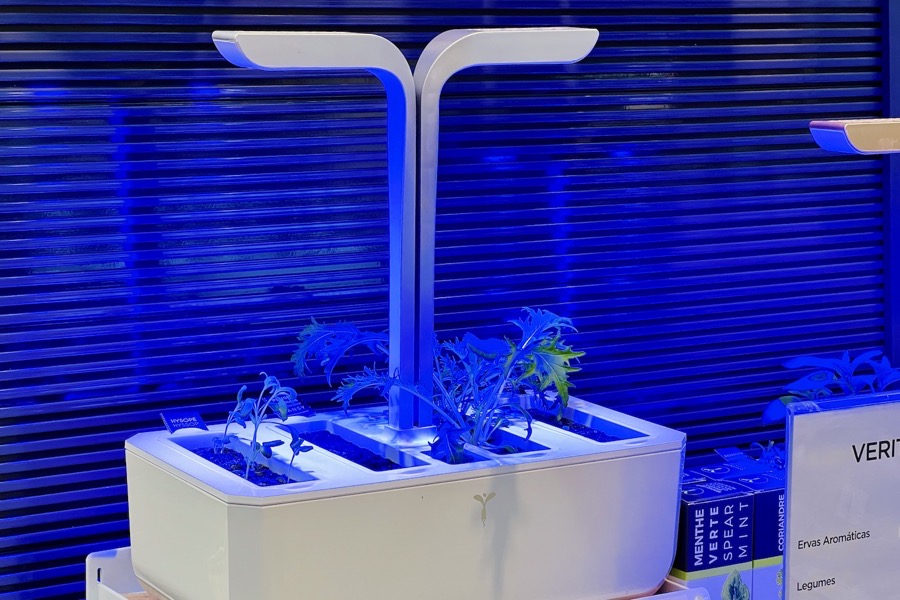
I also met a person with a beautiful family name: Vagarinho
It means Little Wanderer in Portuguese.
Same root as Vagrant, which also comes from the Latin word vagari, meaning to wander.
We are all Vagarinhos. :-)
On my way home I walked by a school and saw this on the wall:
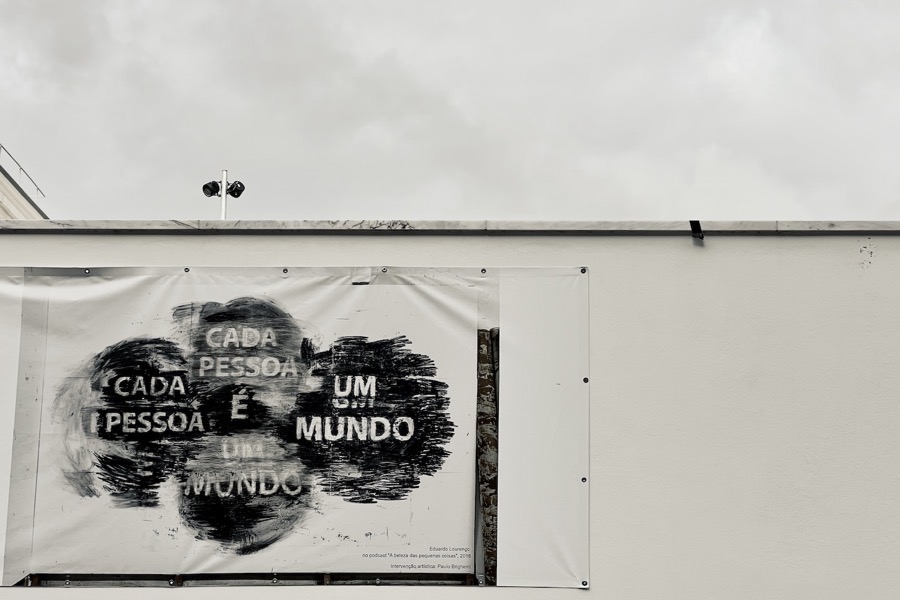
“Every person is a World”







